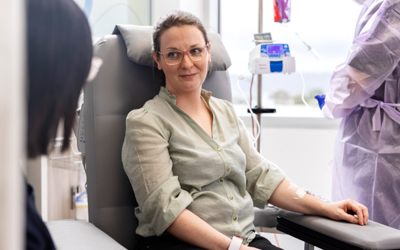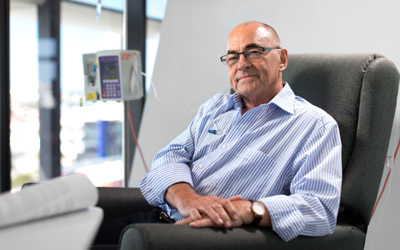What is constipation?
Constipation refers to bowel motions that are too hard, too small, too difficult to expel and too infrequent.
Normal bowel habits may vary from every day to every second or third day. Not having a bowel movement every day doesn’t necessarily mean you are constipated. It’s important to know what is normal for you and what isn’t.
What causes constipation?
There are a number of disease and treatment-related factors which can cause constipation. They can include:
Obstruction, pressure or nerve damage caused by your cancer
Some chemotherapy drugs, including vinca alkaloids and thalidomide
Some anti-nausea drugs you may be given as part of your treatment
Other medications you may be taking, such as iron supplements, antihypertensive agents and pain medication
Reduced mobility and lack of exercise
Poor nutritional status – low fibre diet and inadequate fluid intake
Older age
Changes in lifestyle or routine – lack of privacy may be a cause
What are the signs and symptoms of constipation?
If you’re experiencing constipation, you may pass bowel motions less frequently than usual, pass dry hard stools and have to strain to open your bowels.
You may also experience:
Abdominal distention and pain
Nausea and/or vomiting
Loss of appetite
How can constipation be prevented or managed?
Your healthcare professionals will talk to you about whether you’re at risk of constipation. Here are some strategies which can help you prevent constipation:
Increase your water intake – you should drink two to three litres a day. Prune, apple or pear juice can also help
Increase the amount of food you eat that is high in fibre (for example, wholegrain breads and cereals, fruits and vegetables, beans, legumes and lentils). Consider talking to a dietitian who can support you to manage your diet
Increase physical activity, if you are able
Take preventative laxatives as prescribed
Try to establish a regular bowel routine with privacy and comfort
Report any symptoms of constipation to your health professional

When should I seek help from a health professional?
If your bowels do not open after three days, you should start a bowel management plan which may include stimulant laxatives, stool softeners, osmotic agents and/or suppositories and enemas. This plan will be developed in collaboration with your doctor. Although many of these medications are available without a prescription, it’s important to talk to your care team before taking any medication.
Constipation becomes a problem when it leads to other complications such as haemorrhoids or bowel blockages. It’s very important that you talk to your care team if you experience excessive pain or bleeding from the rectum.
When your white cell count or platelet counts are low, constipation can result in a higher risk of infection and/or bleeding so you should report any signs of constipation early.
Every patient is different, please discuss your own personal situation with your treating doctor of Icon care team.
Common side effects from chemotherapy
Constipation
Anaemia Appetite and taste changes Bleeding and low platelets (thrombocytopenia) Diarrhoea Feeling emotional Flu-like symptoms Hair loss Hand foot syndrome Infection Infertility Lymphoedema Mouth sores or ulcers Nausea and vomiting Peripheral neuropathy Sexual dysfunction Skin and nail changesReady to discuss your care?
We’re here to support you through your treatment. Get in touch with us for more information about our centre and the services we offer.




